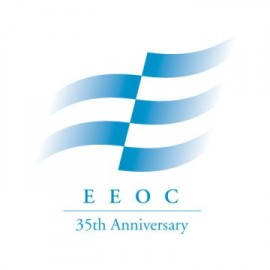IT WAS RECENTLY reported that a London bank had laid off some employees — nothing unusual about that these days. But there was a buzz of discussion about the fact that, horror of horrors, they had supposedly laid off foreign workers in greater proportion than British ones. One writer said that the bank “should be reported to the Equalities Commission.”
One sees the same kind of furor amongst the TV-watchers here in America if a business fails to favor some members of, as the Newspeak expression goes, a “protected class” — like homosexuals or non-Whites. The only real difference is that our Commissars are called “EEO officers” instead of “Equalities commissioners.”
But it doesn’t matter what they’re called. Only in an insane or 1984-style world would there be such a thing as an EEOC or an “Equalities Commission.”
I’m no friend of the banks — in fact, commercial banking as it exists today differs little from a legalized con game. But employees and employers, if there is to be even a moderate degree of freedom in this world, ought to be able to decide with whom to associate (or not associate) with absolute freedom.
Employment should require the agreement of two parties — employer and employee. If one or the other disagrees on terms, they peacefully go their separate ways. Except for voluntary associations like unions, no third party should have any say or standing whatever.
The government interference started when corrupt and paid-off police and government officials cruelly suppressed the efforts of employees to form organizations of their own. So the union folks — some of them innocent of any anti-freedom agenda, though totally oblivious to the principles involved — decided that the only way to get fair treatment was to get and use governmental power for their side. And they did, in spades — spawning endless laws that violate the Constitution and the principle of free association; laws which have been exploited by venal politicians, multiracialist change-agents, and others.
But their laws are pretended laws, and the principle of free association remains. If I want to hire only Pakistani-speakers or women, that’s my business and no one else’s. If I will work only for companies that agree that I can bring my dog to work, that’s also no one else’s business. If I will work only for companies that recognize a employee’s union that I am comfortable with, that’s not the government’s business either.
If an employer wants to hire only English-speakers — or only Spanish-speakers — or only brunette women between 20 and 40 with Master’s Degrees, it seems either tyrannical or insane to criminalize that.
Yes, I know that some Black- or Arab-owned businesses would, given the chance, hire only their own people. And so would many White-owned businesses. But that’s a good thing. Ninety per cent. of the racial conflicts in this world could be solved voluntarily and peacefully if free association were restored. It’s Nature’s way, in addition to being freedom’s way.
But the law disagrees with you! some would say.
And there we have the crux of the problem — not that the “law disagrees” with me, but that it is widely believed (and even more widely pretended) to be constitutional and wise to have laws which interfere with free private agreements between parties.
With “the law” as it is now commonly believed to exist, you have hundreds of factions and interest groups trying to use legislation or tortured interpretations of legislation to force one group or another to cough up money, or or hire more members of group X — and it all ends up with a judge or demagogic attorneys making subjective determinations of “what is best.”
That kind of arbitrary use of force or threatened force is pretty close to exactly what the authors of the Constitution were trying to avoid. And it sure as Hell isn’t freedom.

